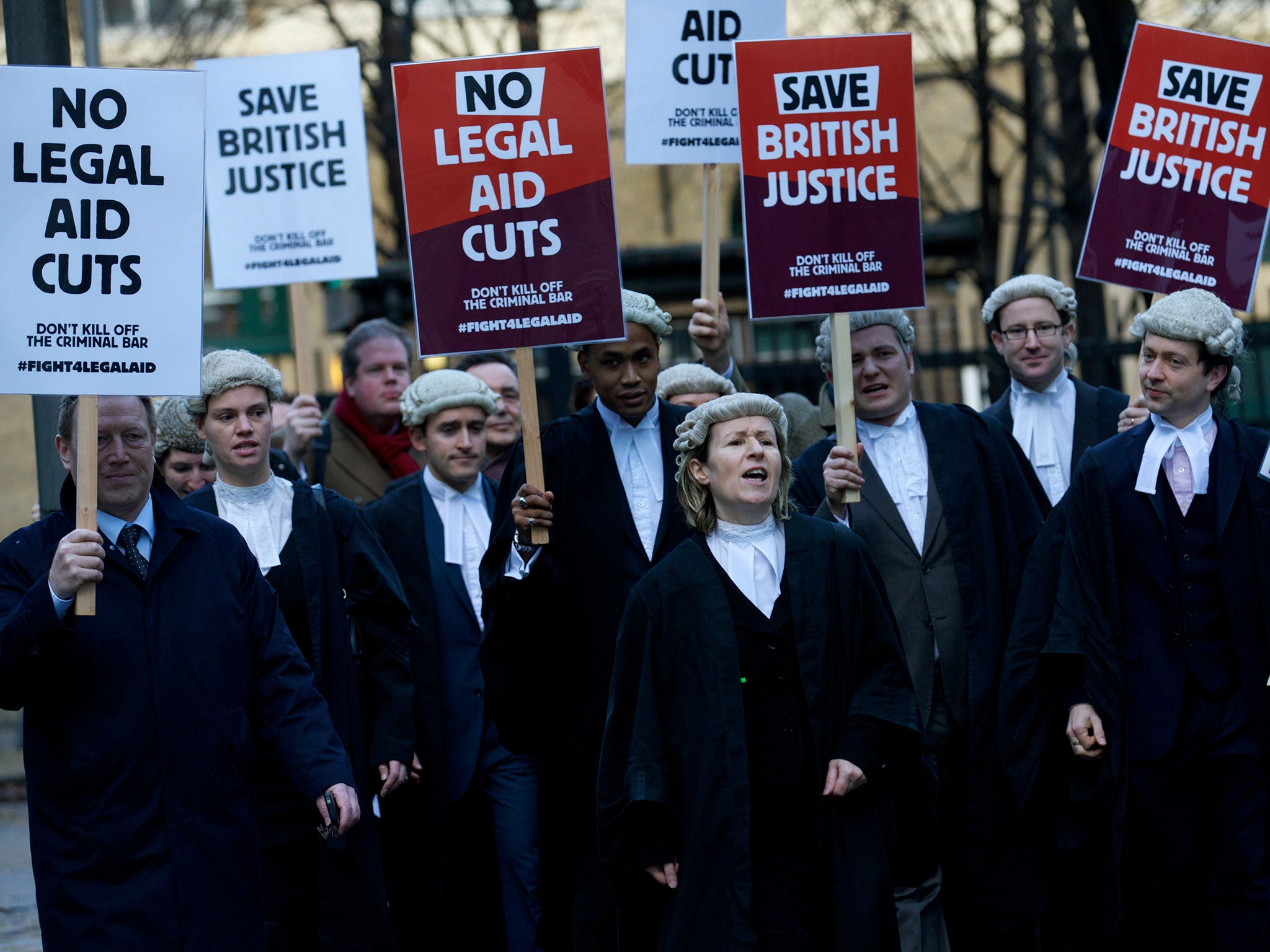Legal aid cuts: Criminal barristers' strike will go ahead despite last-minute feud with solicitors
Relations between the two tribes of lawyers have broken down in recent days

Your support helps us to tell the story
From reproductive rights to climate change to Big Tech, The Independent is on the ground when the story is developing. Whether it's investigating the financials of Elon Musk's pro-Trump PAC or producing our latest documentary, 'The A Word', which shines a light on the American women fighting for reproductive rights, we know how important it is to parse out the facts from the messaging.
At such a critical moment in US history, we need reporters on the ground. Your donation allows us to keep sending journalists to speak to both sides of the story.
The Independent is trusted by Americans across the entire political spectrum. And unlike many other quality news outlets, we choose not to lock Americans out of our reporting and analysis with paywalls. We believe quality journalism should be available to everyone, paid for by those who can afford it.
Your support makes all the difference.Criminal barristers across Britain will begin striking in earnest on Monday over cuts to legal aid, despite a last-minute feud with solicitors.
Some barristers have been striking alongside solicitors since 1 July as part of a boycott of new legal aid work to coincide with the introduction of an 8.75 per cent fee reduction imposed by the Government.
But the Criminal Bar Association (CBA) only voted in favour of strike action on 15 July, when it decided the first official day of the strike would not take place until Monday.
On Thursday, criminal legal aid lawyers met the Lord Chancellor, Michael Gove, to discuss a solution, though none was reached.
The CBA was invited to the meeting but did not attend – a fact which left many solicitors concerned that the group was hoping to curry favour with Mr Gove for a better deal. In two of the most recent rounds of cuts, the Ministry of Justice agreed not to cut barristers’ fees when they cut those of solicitors, and commentators have observed that Mr Gove praises barristers much more frequently than solicitors.
Jonathan Black, president of the London Criminal Courts Solicitors’ Association, who was at the meeting with Mr Gove, said the Justice Secretary was “willing to listen to representations and arguments” more than he had anticipated. However, he was concerned that Mr Gove’s “energy was focused on the quality of work in the Crown Court, rather than the quality of provision in police stations and magistrates’ courts where 93 per cent of criminal cases are heard.”
He added: “It’s divide and rule really. He’s prepared to consider the barristers’ concerns about quality of advocacy as a priority.”
Relations between the two tribes of lawyers further broke down after solicitors decided on Friday that following three weeks on full strike, they would now only strike in relation to Crown Court cases.
The decision was made by the Criminal Law Solicitors’ Association, the London Criminal Courts Solicitors’ Association and the Big Firms Group. An email went out from the CBA’s chairman, Tony Cross, on Friday saying the new solicitors’ position “appears to alter fundamentally the basis upon which our members voted to support solicitors’ action” and announcing an emergency meeting of the leadership to take place tonight.
Solicitors fear that their decision to strike only over Crown Court cases will be used as an excuse by the CBA to wriggle out of taking part in industrial action. Campaigners worry that the CBA executive, most of whom did not support a strike, will now try to turn members against it, but sources close to the CBA said it was “very unlikely”.
A spokesman for the CBA said: “Our recommendation remains that the action starts [today]. The CBA executive is due to meet [this] evening to discuss a change in the criminal solicitors’ joint protocol which provides for solicitors resuming work in magistrates’ courts and police stations.”
A Ministry of Justice spokesman said: “The changes we are making to criminal legal aid are designed to deliver value for money to taxpayers and do not impact on the availability of high-quality legal advice to those who need it most.”
Join our commenting forum
Join thought-provoking conversations, follow other Independent readers and see their replies
Comments